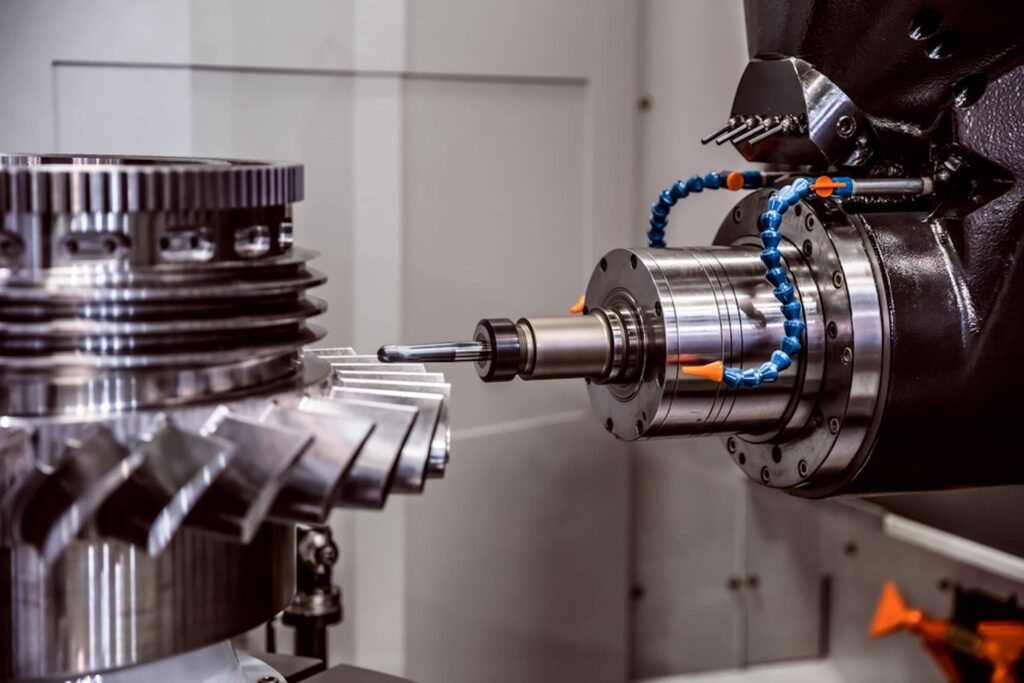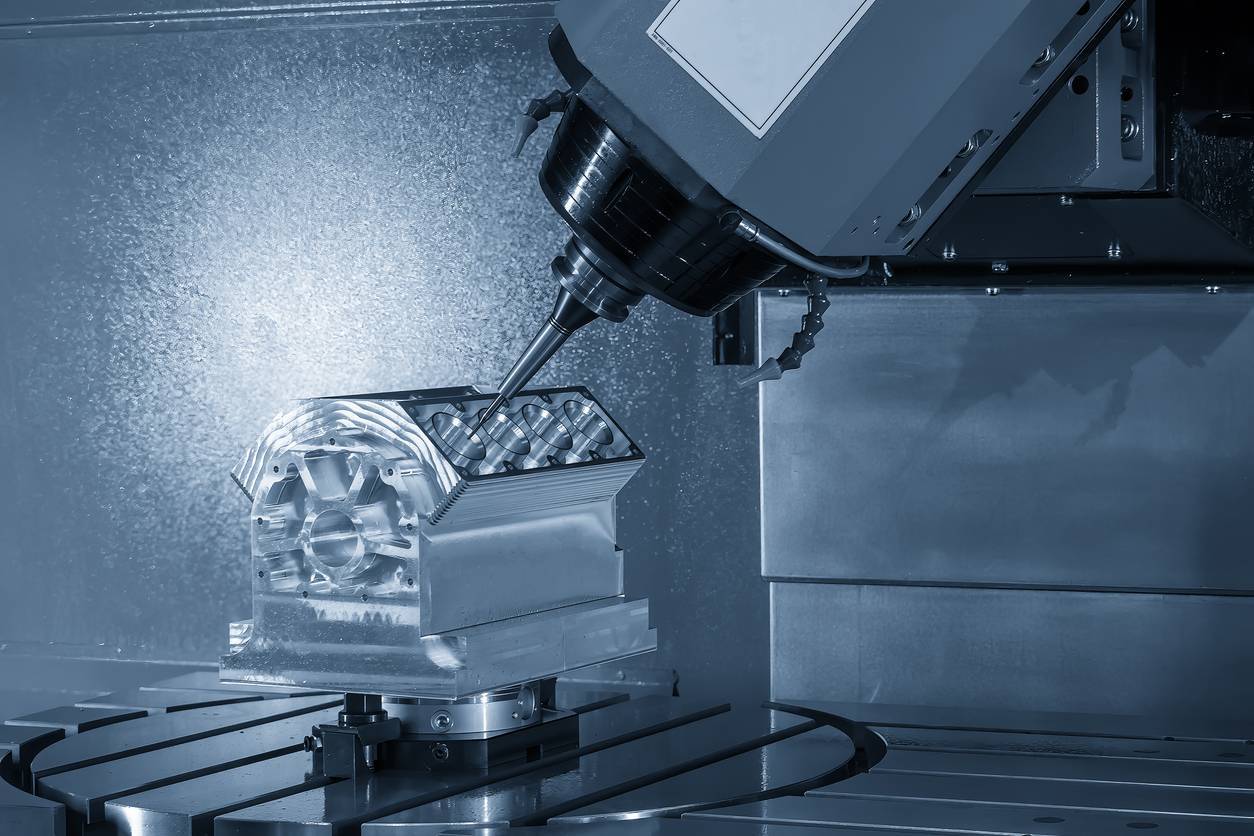Your guide about working with a tool and die maker
Boost Your Manufacturing High Quality With Professional CNC Machining Services in Milling and Transforming
CNC machining solutions in milling and transforming offer considerable advantages for manufacturing procedures. These procedures assure accuracy and effectiveness, important for creating high-grade elements. With innovative innovation and skilled machinists, organizations can attain remarkable coatings and detailed layouts. Comprehending the nuances of these solutions is vital for maximizing their benefits. What aspects should companies take into consideration when choosing the best CNC machining companion?
Understanding CNC Machining and Its Advantages
Lots of manufacturing processes exist, CNC machining stands out due to its accuracy and efficiency. This sophisticated production technique uses computer-controlled devices to generate elaborate get rid of minimal human treatment. By automating the machining procedure, it substantially minimizes the probability of human mistake, making sure constant top quality across production runs
CNC machining provides various advantages that attract various industries. To begin with, it accommodates intricate designs that conventional methods may battle to attain. The rate of production is improved, allowing for quicker turnaround times and raised outcome. Furthermore, CNC machining is flexible, appropriate for a variety of materials, including compounds, plastics, and steels.
The procedure enables for very easy changes, making it possible for fast prototyping and modification without considerable retooling. As an outcome, services can respond swiftly to market demands, making CNC machining a vital component of modern-day production methods.

The Significance of Precision in Milling Processes
Accuracy is vital in milling procedures, as it straight influences the precision of the end product. The choice of materials likewise plays a considerable role, influencing how well the machining procedure meets specified resistance standards. Comprehending these elements is vital for achieving suitable cause CNC machining.
Role of Precision
Attaining high levels of accuracy is crucial in grating procedures, as also the smallest discrepancy can bring about significant errors in the end product. Accuracy in CNC machining directly influences the performance, performance, and long life of the manufactured components. Precise grating warranties that tolerances and dimensions are satisfied, which is necessary for components that must fit together perfectly in setting up or run under certain problems. In addition, the duty of precision extends to reducing waste and rework, thus improving general production efficiency. Advanced CNC devices furnished with advanced software program and tooling add to acquiring the essential accuracy. By prioritizing precision in milling, makers can ensure high-grade results that fulfill rigorous market requirements and client expectations.

Material Option Effect
Material choice plays an important duty in the milling process, affecting both the high quality of the end product and the efficiency of manufacturing. Various materials show distinct residential or commercial properties such as solidity, tensile strength, and machinability, which straight impact the milling method used. Harder materials might call for specialized devices and slower feed prices to avoid device wear and keep precision. On the other hand, softer products can be crushed at higher speeds however might lack toughness. In addition, the choice of material can impact surface area coating and dimensional accuracy, necessitating cautious factor to consider by suppliers. Ultimately, choosing the proper product not just boosts product performance but likewise enhances the milling procedure, minimizing waste and boosting total productivity.
Tolerance Criteria Relevance
While the selection of products is crucial, adherence to tolerance requirements is just as important in CNC machining procedures. Tolerance requirements determine the permitted restrictions of variant in dimensions, guaranteeing elements fit and work properly. In milling and turning operations, accurate tolerances enhance product quality, lower waste, and decrease rework. When resistances are properly preserved, makers can accomplish constant results, which is essential for industries such as aerospace, automotive, and clinical tools, where accuracy is critical. Discrepancies from established criteria can cause setting up issues, compromised efficiency, and boosted costs. Understanding and executing correct resistance standards is basic for any type of CNC machining solution seeking to keep high manufacturing quality and fulfill client requirements efficiently.
Enhancing Performance With Advanced CNC Turning
Advanced CNC transforming techniques substantially enhance performance in element production by guaranteeing high accuracy in manufacturing. This raised accuracy not just improves the general quality of the components produced however also contributes to lowered manufacturing time. As an outcome, producers can attain higher result while maintaining rigid quality requirements.
Accuracy in Component Development
CNC transforming technology has changed precision in element development, making it possible for producers to attain extraordinary precision and performance. Utilizing computer-controlled lathes, this sophisticated procedure meticulously shapes materials right into detailed layouts, making sure tight tolerances that fulfill requiring specifications. The automation fundamental in CNC transforming lessens human mistake, causing consistently premium parts customized to details needs. Additionally, the ability to rapidly customize digital styles enables for fast versions, improving the personalization of components without compromising accuracy. Therefore, markets varying from aerospace to vehicle advantage considerably from these innovations, as they can generate intricate geometries easily. Inevitably, CNC transforming stands as a foundation of contemporary manufacturing, driving precision and integrity in part production.
Minimized Production Time

Key Technologies in CNC Machining
Various essential innovations drive the effectiveness and precision of CNC machining, allowing producers to produce complex parts with high accuracy. Central to these advancements are Computer system Assisted Layout (CAD) and Computer System Helped Manufacturing (CAM) software, which simplify the design-to-production procedure. CAD enables for complex designs to be created and manipulated electronically, while web cam equates these styles into machine guidelines.
Additionally improving precision are multi-axis machining facilities, which make it possible for cutting tools to relocate along several axes concurrently, decreasing the need for numerous configurations - cnc turning service. Furthermore, developments in tooling products and finishes have boosted toughness and you could look here performance, permitting for much better surface coatings and extended device life
Automation technologies, consisting of robotics and intelligent software program, assist in real-time monitoring and changes during manufacturing, guaranteeing uniformity and quality. Jointly, these technologies not just enhance manufacturing capacities yet likewise add to the overall dependability of CNC machining solutions.
The Function of Skilled Machinists in High Quality Manufacturing
Experienced machinists play a crucial role in making sure the quality and precision of CNC machining manufacturing. Their knowledge straight influences the outcome of producing procedures, as they interpret technical drawings, established up equipments, and select proper devices for each project. By possessing a deep understanding of machining concepts, they can make real-time changes to optimize performance and maintain tight tolerances.
Knowledgeable machinists employ their analytical capabilities to identify and remedy issues throughout manufacturing, stopping issues and making certain that the last items fulfill rigorous quality criteria (jig and fixture tooling). Their knowledge with various products and machining strategies permits them to adapt to diverse project requirements, improving general performance
On top of that, these experts usually collaborate with engineers and developers, giving valuable insights that add to the continual improvement of manufacturing methods. Eventually, the relevance of skilled machinists in CNC machining can not be overemphasized, as they form the backbone of high-grade manufacturing operations.
Reducing Waste and Optimizing Resources
Effective CNC machining not just relies on the experience of skilled machinists but likewise stresses the value of lowering waste and enhancing resources throughout the production process. By utilizing innovative innovations and accurate programs, producers can decrease material waste, guaranteeing that every piece of basic material is made use of effectively.
Integrating methods such as nesting, where parts are set up to make best use of material usage, can especially reduce scrap production. Furthermore, real-time monitoring of device efficiency enables immediate official source adjustments, avoiding overflow and resource depletion.
Furthermore, executing lasting practices, such as reusing steel shavings and making use of environment-friendly materials, adds to both expense savings and ecological responsibility.
Via these actions, CNC machining services can boost productivity while preserving high-quality requirements, ultimately resulting in a much more lasting and lucrative procedure. By focusing on source optimization, businesses can achieve better efficiency and a reduced environmental impact in their production procedures.
Picking the Right CNC Machining Solution for Your Needs
How does one determine the very best CNC machining solution for details job requirements? Selecting the suitable CNC machining solution entails numerous vital considerations. Project requirements, including product resistances, dimensions, and kinds, have to be clearly specified. This guarantees that the selected solution can meet the technical needs of the task.
Second, evaluating the company's experience and experience in the relevant market can give insights into their capacities. Analyzing previous tasks and client reviews can better inform the decision.
Third, assessing the readily available modern technology and machinery is vital, as innovative tools frequently causes greater accuracy and performance.
Finally, cost and turnaround time ought to be thought about to ensure the solution straightens with financial restraints and target dates. By very carefully examining these aspects, services can recognize the CNC machining solution that finest fits their special manufacturing requirements.
Often Asked Questions
What Materials Can Be Used in CNC Machining?
CNC machining can utilize a selection of products consisting of metals like steel, light weight aluminum, and titanium, along with plastics such as acrylic and nylon, and compounds, supplying flexibility for different manufacturing applications and sectors.
For how long Does a Common CNC Machining Project Take?
A typical CNC machining task can take anywhere from a couple of days to a number of weeks, depending on variables such as intricacy, material kind, layout specs, and production quantity. Timelines vary based on task demands and urgency.
Are CNC Machining Provider Eco-friendly?
CNC machining services can be eco-friendly, specifically when using effective procedures and sustainable products. Waste reduction and energy-efficient equipment add to a lower ecological impact, making these solutions a practical alternative for eco-conscious production.
What Industries Frequently Make Use Of CNC Machining Services?
CNC machining solutions are commonly used in various sectors, including vehicle, aerospace, electronics, medical tools, and manufacturing. These fields depend on accuracy machining for components that need high precision, efficiency, and repeatability in manufacturing procedures.
How Can I Prepare My Layouts for CNC Machining?
To prepare designs for CNC machining, one ought to assure proper data layouts, optimize dimensions for resistance, include required machining functions, and take into consideration material properties. Furthermore, giving detailed paperwork can boost the production process's efficiency and accuracy.
While the option of products is essential, adherence to tolerance requirements is just as critical in CNC machining processes. Proficient machinists play an essential role in making certain the top quality and precision of CNC machining production. A common CNC machining job can take anywhere from a couple of days to several weeks, depending on factors such as complexity, material type, style specs, and production volume. CNC machining services can be ecologically friendly, especially when using reliable procedures and lasting products. To prepare styles for CNC machining, one ought to ensure appropriate file formats, optimize measurements for resistance, include needed machining functions, and think about material homes.